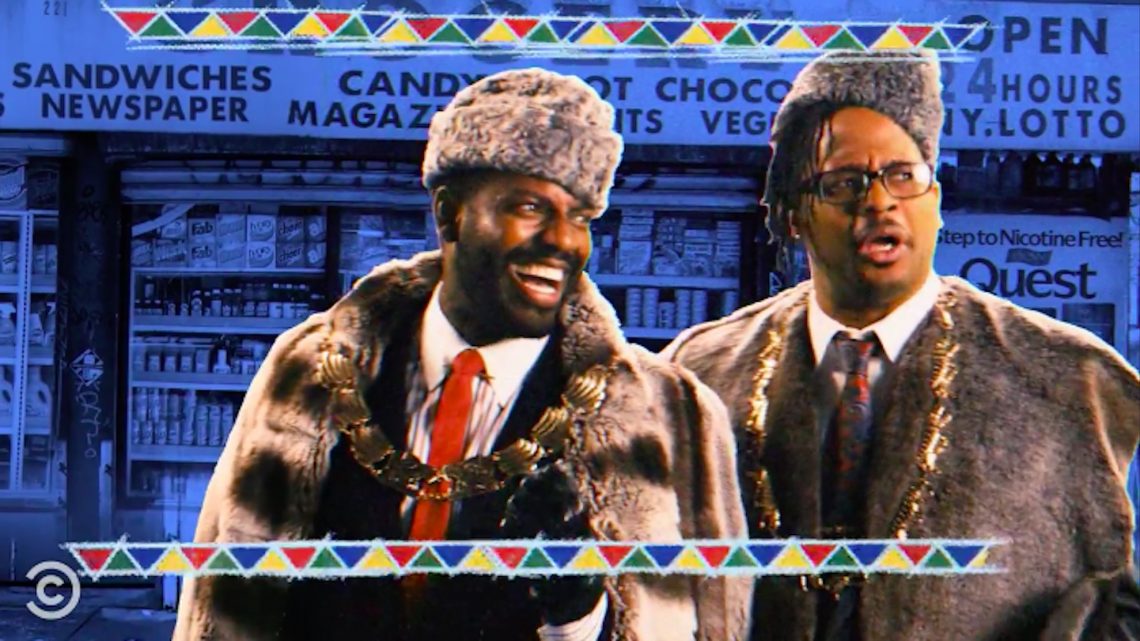
Comedy Central’s ‘The New Negroes’ Is Perfect for the Black TV Renaissance
April 26, 2019When comedian Baron Vaughn and rapper Open Mike Eagle brought their all-Black stand up show from LA to Comedy Central and named it after a phrase from the Harlem Renaissance, they knew they were making a bold statement. But The New Negroes, their extremely hype new show, really does have Renaissance-level aspirations, harnessing the legacy of Black comedians as truth-tellers to challenge limiting stereotypes that persist within broader society and the community alike.
“We borrow our title from a book that comes from when the fight for redefinition was against a very very clear [white] opposition,” Eagle said over the phone from LA, referring to The New Nego: An Interpretation, a 1925 anthology of essays that became foundational for the Renaissance movement. “I think the fight now is a lot more nuanced, and the way we fight now is about giving people the platform to be whoever they are.”
Their 30-minute weekly show highlights eclectic emerging talents like Ed Greer and Candice Thompson along with more recognizable faces like Hannibal Buress, Lil Rel Howery, Saturday Night Live’s Chris Redd, and Insecure’s Langston Kerman. Every episode wraps with a very trippy music video collab between Eagle and a musical guest that weaves together social commentary and out-there graphics; in one video, Eagle is frustrated with his office job and Danny Brown literally comes out of his body to help him properly vent his rage. Other guest musicians include Lizzo, Method Man, and MF Doom.
The New Negroes is just one of a number of recent comedy shows with Black hosts that make race a prominent theme, like 2 Dope Queens or Desus and Mero. But those shows aren't exclusively about Blackness. The New Negroes’ explicit focus on race opens up new possibilities for what its comics can say and the social functions the show can have.
For one thing, they can drop more references to Black culture without giving much preface. The show’s theme song segment features the hosts against various backdrops reminiscent of other Black comedy staples like Chappelle's Show, In Living Color, or Coming to America. And their set even has a touch of Def Poetry Jam or Def Comedy Jam's afrocentric vibe, with a giant afrofuturist mural of a Black woman that looks like a lost Erykah Badu cover. But when the hosts hop on stage, they build on that shared understanding to open candid conversations about subjects like police harassment and double consciousness. “As a minority, you’re used to having to explain yourself, but having an all Black show is a little bit of a break from that,” Eagle said.
But the show also uses that common foundation to break down barriers and tackle issues within the Black community itself. At times, that comes in the form of addressing topics head on, like making fun of “performative wokeness,” with a music video where two men try to “out woke” one another. But Vaughn and Eagle’s choice of guests is itself a statement about making room for less conventional Black creatives, whether it’s Kerman talking about the trials and tribulations of being a Black person who doesn’t care about politics, or a middle-aged Black woman, Shalewa Sharpe, detailing her hilarious experiences on dating apps.
“Mike has had the experience as a hip-hop artist of people telling him he’s not hip-hop, and I’ve had people tell me I’m not comedy,” Vaughn said. “But what we’re about is accepting everyone is who they are. Some people are hood rich and some people are silly or into anime, and it’s all good.”
That desire to promote sidelined voices within the Black community is of a piece with the creators’ drive to shake things up within the world of Black comedy. “Some comics tend to lean into certain stereotypes that become the common fodder for what people expect stand up to look and feel like, instead of challenging and subverting those things,” Vaughn said.
Judging from the first three episodes, their guests definitely seem to have gotten the memo that the show is a good place to experiment with set-ups that might otherwise cause a Black Twitter user or Black person at a mixed show to raise an eyebrow. Candice Thompson jokes that she passes for white whenever Black people are embarrassing her (ie, whenever Ray J drops an album), and David Gborie makes the case that he’s more like Donald Trump than Jay-Z, because he’s pretty sure Jay-Z has never done half the dumb things he did as a child. The fact that they’re saying these things within the context of the show seems to give them a certain benefit of the doubt, one that enables them to work off of potentially offensive premises without a problem.
Much like Jordan Peele’s movies or Beyonce’s Coachella set, The New Negroes offers its own brand of double consciousness, pairing entertainment with a message in a way that can resonate with any intersection of the identity groups it centers, albeit in different ways. As Vaughn pointed out during our call, we’re living in the midst of a larger renaissance of Black television, “from Lena Waithe to Issa Rae, Donald Glover, 2 Dope Queens, Desus and Mero, Random Acts of Flyness, United Shades of America, and Problem Areas with Wyatt Cenac.” But it’s especially important for Black stand up to get its own platform in this broader moment, because the actual renaissance was as much an intellectual movement as it was a creative explosion, and comedians actually have a lot in common with the academics and writers that shifted consciousness in the past.
“They’re philosophers of the world and studying their own lives and the connections around them,” Vaughn said.
He and Eagle don’t take that point lightly. “The fact that people come to comedy for original observations puts comics almost at the vanguard of original thought,” Eagle said. “It’s like comics are at the watchtower of society noting things, putting the mirror back in front of us.”
Sign up for our newsletter to get the best of VICE delivered to your inbox daily.


